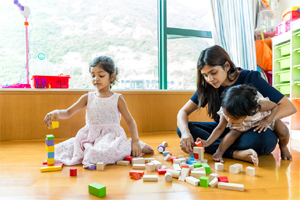What! Why can’t I say “Good job” to my kids? By Dr. Namitha Raju

Negative Effects of Praising
|
Wouldn’t praising kids encourage them to do well? The answer is ‘No!’
I won’t be surprised if you think, “What’s wrong with encouraging my kids?” I am myself recovering from being in the ‘good-jobbing-camp’ for a very long time and still catch myself saying it occasionally! I always assumed that saying “Good job” encouraged kids. I believed praising kids was a valuable parenting skill to build a kid’s confidence. While praising may seem like it encourages kids to do well, surprisingly, I have learned that it erodes a child’s inner confidence!
Let’s start by backtracking a bit. Many of us have grown up in a home where our parents were quite frugal with their praises but liberal with their disapprovals, and we felt unappreciated. This led us to believe that praising our kids can help their confidence. It turns out that just as criticism negatively affects one’s self-esteem, praise has its own fair share of negative impact! When I first learned about the way praise negatively affects one’s confidence, I was somewhat surprised. A disappointment followed this revelation because I felt miserable about having deliberately practiced praising for so long!!

Let me first share why praising our kids is not a good idea. Any praise aimed at our kid’s character or the outcome (e.g., smart, intelligent, pretty, brave, good job, excellent grades) focuses on something a kid has no control over! A kid can only control what he can do, not what the result is. Moreover, praise is an external motivator that hinders one’s ability to build intrinsic motivation. Let us take a specific example where an adult praises a kid who solves a puzzle by saying, “You are so smart!”. To secure this reputation or acceptance from the adult, kids may not attempt a more challenging puzzle for fear of losing this “reputation” in case he/she may fail. This causes pressure each time he/she sees a difficult problem at first.
Instead of exploring it further, they start withdrawing under the pressure of not being able to meet the expectation that has been set for them. Thus praising takes away our kid’s curiosity to explore challenging tasks.

Moreover, when adults who are usually very vocal in their praise are silent in their response to a child’s task, it sends a message to the child that they are not good enough. Further, in the case of activities where there aren’t any opportunities for praise, kids may tend to avoid it or be apathetic about it. No matter how young our kids are, they are in the process of finding an identity for themselves and can quickly latch on to labels like “smart or intelligent, or kind.” This dependency or addiction on others’ praise to feel accomplished doesn’t serve kids well in their self-growth. Kids can lose their internal compass in assessing themselves and may not build the ability to self-evaluate. Another side effect is that it creates “people-pleasers” who tend to go out of their comfort zone to do things for others to receive acceptance and maintain desirable labels!
So, what’s the alternative to motivating our kids?
The best alternative is not to say anything when they do something. The idea is not to ignore them or their work but to stay away from any kind of evaluation, positive or negative. It’s best not to say anything because the completion of the task or activity without any external influence will provide the child with an opportunity for self-evaluation. If that feels like a difficult transition for you and your child, then participate and engage with the kid and get curious about your kid’s activity in the task. Instead of telling them what you think, you can ask them what they think about it. For example, in the case of the puzzle example, you can say, “How do you feel about completing the puzzle? Did you use any strategy to work through it?”. These questions try to bring the child’s focus back on their own actions, as the parent provides the scaffold for their thinking processes.

Parents have shared with me that in their relationship with kids, offering praise or showing approval for a job well done is the only time they feel like they are connecting with kids. However, if we think deeply, this conditional connection is not our intent for our kids. Conditional acceptance kills our kid’s curiosities, depriving them of developing the critical qualities that make them lifelong learners!
So, if you are, as I was, in the “good-jobbing-camp,” I would encourage you to reconsider your approach. As parents, we want to consider our motives for offering praise. Let us ask ourselves if our comments will give them a sense of control or if it will make them seek us for approval. As parents, we are all doing the best we can to ensure that our kids can achieve their maximum potential. I hope this revelation helps you in this endeavor!
About the Author
 Namitha Raju is a Certified Master Parent Coach. She coaches parents to develop deep connections and peace in their relationships with their kids. Her company, Beautiful Bonds, is based on the principle that emotional growth, healthy relationships, and personal transformation are the keys to fulfilling parenthood. Dr. Raju received a Ph.D. in Psychology, where she studied early development. As a mom of two kids, she found that her academic experience couldn’t rescue her from her day-to-day parenting challenges! Her curiosity led her to garner the expertise necessary to inculcate deep connections between parent and child. She serves parents virtually throughout the US. If you would like to find out more, please visit https://beautifulbonds.me.
Namitha Raju is a Certified Master Parent Coach. She coaches parents to develop deep connections and peace in their relationships with their kids. Her company, Beautiful Bonds, is based on the principle that emotional growth, healthy relationships, and personal transformation are the keys to fulfilling parenthood. Dr. Raju received a Ph.D. in Psychology, where she studied early development. As a mom of two kids, she found that her academic experience couldn’t rescue her from her day-to-day parenting challenges! Her curiosity led her to garner the expertise necessary to inculcate deep connections between parent and child. She serves parents virtually throughout the US. If you would like to find out more, please visit https://beautifulbonds.me.
























